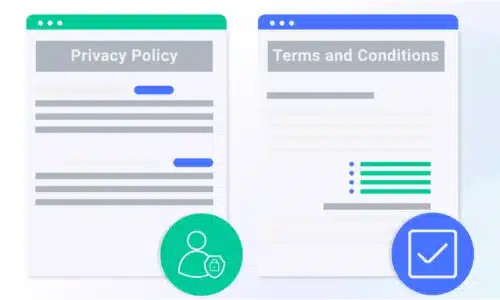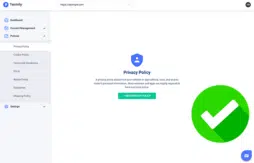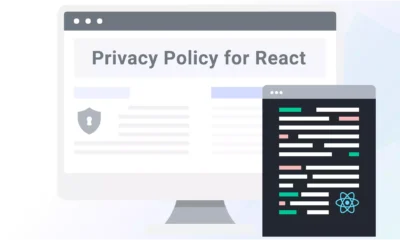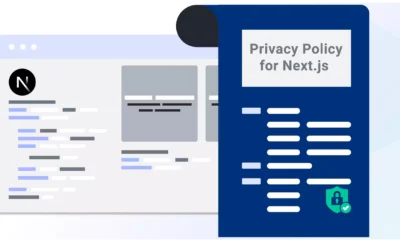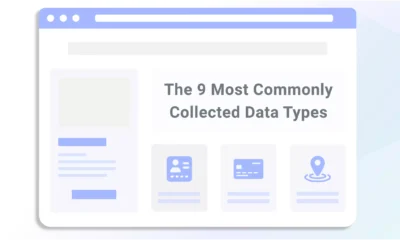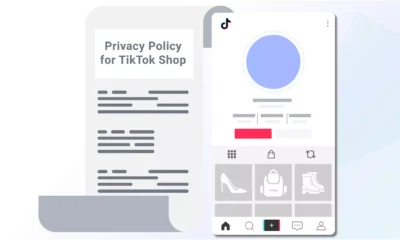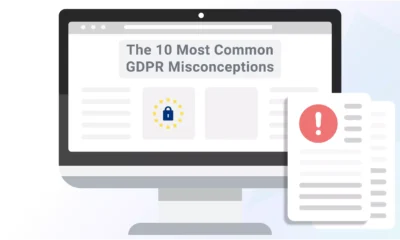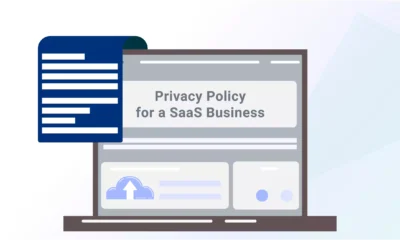Privacy policies and terms and conditions are legal documents you may need to include when setting up a website or app. They are vital if you handle user data or allow for account creation.
This article will further break down the differences between a privacy policy and a terms and conditions agreement, what goes into each, and when you’ll need one or both for your website.
Privacy Policies Explained
Privacy policies are legal documents that inform users about how their personal data is handled and what rights they can exercise over their data, such as the right to data deletion. They will typically contain details about the type of personal information collected, who it’s shared with, and how it’s stored.
To further elaborate, a privacy policy:
- Is a legal document that helps businesses comply with privacy laws and consumer protection laws
- Discloses the ways the user’s personal data will be collected, managed, and used
- Explains for what purpose that data will be collected
- Reminds the user of their data privacy rights to consent and access of their data
- Discloses whether or not data will be sold to third parties (which must be done with consent)
Users don’t need to consent to privacy policies because they are not a legal contract between the website and the user. Instead, a privacy policy is an informative document that helps businesses comply with privacy laws by being transparent about how they collect and use personal data.
Privacy policies are required by the General Data Protection Regulation (GDPR), the California Consumer Privacy Act (CCPA), and California Online Privacy Protection Act (CalOPPA), three major data privacy regulations.
Other regional laws may also require you to generate a privacy policy, such as the Colorado Privacy Act, the Virginia Consumer Data Protection Act, or the Connecticut Personal Data Privacy and Online Monitoring Act.
Usually, you’ll need to adhere to these laws if you service residents from those areas, even if you’re not located there.
Terms and Conditions Explained
Terms and conditions agreements are not typically legally required; neither the GDPR nor the CCPA requires websites to include terms and conditions.
Nevertheless, terms and conditions are essential for your website or app, setting expectations for the service to be received and how users must conduct themselves.
They can also help to limit your legal liability and protect your copyright rights, which are protected by law.
Think of terms and conditions as a general set of bylaws for your website or app that:
- Are directly enforced by website owners rather than legally binding and should be agreed upon before user registration is complete
- Are a broad agreement about the service offered and expectations for the user
- May include terms of payment, activity, and conduct
- Include penalties for failing to abide by the terms (such as suspension or fees)
- Can limit legal liability if users choose to contest a website owner’s action
- May include rules about your intellectual property (copyright and trademarks) which CAN be legally enforced
Privacy Policies vs. Terms and Conditions
The difference between a privacy policy and terms and conditions is that a privacy policy protects your users’ rights, while terms and conditions protect your website or app’s rights.
Privacy policies outline how you interact with user data, and terms and conditions outline the rules for using your site.
There is some overlap between privacy policies and terms and conditions agreements, but the main differences can essentially be broken down this way:
| Privacy Policies | Terms and Conditions |
| Required by law | Not required by law but set expectations of liability |
| Enforced by law (fines or restrictions to the website in the event of a breach of data privacy) | Directly enforced by the business owner (by imposing suspensions, restrictions, or fees onto users for breach of terms) |
| Written to protect the privacy of the user | Written to protect the rights of the business, as well as the environment of the business (i.e. terms banning hate speech or harassment of users) |
| Explain the user’s data privacy rights and how their data will be collected and used | Explain owner’s copyright terms, fair use, and general intellectual property rights |
| Lay out how to access and delete your personal data within your rights | Lay out how to cancel or pause your account or subscription |
| Include any information about international data transfers | May include terms about international payments and shipments based on the business’s capability |
| Are an agreement allowing the website or app to collect, manage, and use data in the ways outlined in the policy | Are a set of ground rules for conduct and expectations for service on the website or app as a whole |
Privacy Policies Protect the User; Terms and Conditions Protect the Website
The purpose of a privacy policy is to adhere to data privacy laws and protect the user’s data. It lets users know exactly how their data is being used and when, if ever, it might be sold or shared.
It also informs them of their rights under GDPR, CCPA, CalOPPA, and more. This information is something that users can hold up as proof of a breach of their rights in the event their data is unlawfully used.
In contrast, terms and conditions are meant to protect a website or app’s owner.
They limit your liability by explaining what to expect from the service and how users should conduct themselves.
Additionally, terms and conditions help keep the community aspect of a site or app safe and amiable with rules for community interactions. And lastly, they express the copyright rights that the business owner might hold and how their copyright can and can’t be used.
Privacy Policies Are Required to Comply With Privacy Laws; Terms and Conditions Are Not
Privacy policies are required by several data policy laws around the world. If a privacy policy does not inform users about processing of personal data sufficiently, it can be punished by governing bodies with fines or other penalties.
Terms and conditions, on the other hand, are not mandatory under applicable laws. They enable websites and apps to limit their liability and enforce their own terms for users. They can also restate the owner’s copyright and intellectual property rights, which are protected by law.
Privacy Policies Disclose the Way Data Is Used; Terms and Conditions Dictate Services and Conduct
A privacy policy discloses how data will be collected, used, and managed. It also explains what type of personal data is collected, for what purpose, and how the user can access their data and even delete it.
Additionally, it goes over any possibility of that data being transferred to a domestic third party or overseas.
Terms and conditions outline what the users can expect from a website or app’s service and what is expected of the user. For example, there may be rules related to payment, community, copyright, and liability terms.
In addition, they set the rules for the owner and the user and how the relationship between the two should be conducted.
Finally, these agreements will also include a disclosure of penalties for failing to adhere to the terms and conditions.
Do You Need Both?
It’s typically best practice to have both a privacy policy and a terms and conditions agreement to lend credibility to your website or app.
But if only one of them is legally required, are both truly necessary?
There may be situations where you need one more than the other and some cases in which both are equally required.
Below are some reasons to consider whether you need a privacy policy, a terms and conditions agreement, or both.
When You Need a Privacy Policy
Privacy policies are typically more often needed since several regional privacy laws require them. You’ll need a privacy policy when:
- Your website/app or user base falls under the jurisdiction of a regional data privacy law (or you service users in that region)
- You intend to have users interact with your website or app
- Your website/app collects and uses personal data from users
- Your website/app will transfer data to third parties, especially overseas
When You Need a Terms and Conditions
While not required by law, terms and conditions are still one of the first things you should establish on your website. You need to generate terms and conditions when:
- You plan to have users sign up for and interact with your website/app
- You have an online shop or provide a subscription service
- You have a community element to your website/app
- You have guidelines that you want your users to abide by
- You want to limit liability to your website, app, or business
- You have intellectual property, such as copyright, that you want to protect
When You Need Both
You’ll need both a terms and conditions agreement and a privacy policy when:
- You plan to have users sign up for a membership or service
- You want to stay compliant and limit your legal liability
- You want to maintain good, transparent relationships with your users
- You want to add an air of credibility and trustworthiness to your site
- You have a subscription service that will save users’ payment data
Privacy Policy vs. Terms of Use and Terms of Service
We’ve covered the differences between a privacy policy and terms and conditions and the ways they complement each other. But what about privacy policies vs. terms of use or terms of service?
Fortunately, this one is easy.
Terms of use and terms of service are simply other names for terms and conditions. They all serve the same purpose: to set the expectations for your service and the ground rules for using your website.
Should You Combine Your Privacy Policy and Terms and Conditions?
If you plan to include both a privacy policy and terms and conditions, your next question may be whether to combine them or keep them as separate documents.
It seems as though combining both agreements into one will be easier, both for you and for the users. But combining privacy policies with terms and conditions can often lead to a long, complicated document that is difficult to read.
Privacy policies require numerous clauses unique to them, and when combined with terms and conditions, the agreement can be overwhelming for readers.
Instead, consider drafting separate documents and linking them together.
Include a reference — with a link — to your privacy policy within your terms and conditions and vice versa. That way, your users know to read both carefully but aren’t bogged down by too much information.
Creating both a privacy policy and terms and conditions agreement is a smart, proactive step for any website or app owner. While a privacy policy helps you meet legal obligations under global privacy laws, terms and conditions help set clear expectations and protect your business. Together, they form the foundation of a transparent, trustworthy user experience.
Create your privacy policy and terms and conditions today with Termly’s easy-to-use generators.

